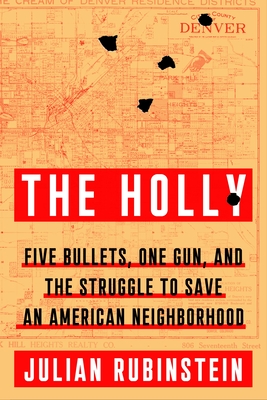The Holly: Five Bullets, One Gun, and the Struggle to Save an American Neighborhood

The Holly: Five Bullets, One Gun, and the Struggle to Save an American Neighborhood
An award-winning journalist's dramatic account of a shooting that shook a community to its core, with important implications for the future On the last Friday evening of the summer of 2013, five shots rang out in the parking lot of a new Boys & Girls Club in a part of northeast Denver known as the Holly. Long a destination for African American families fleeing the Jim Crow South, the Holly had become an "invisible city" within a historically white metropolis. While shootings weren't uncommon, the identity of the shooter that night came as a shock. Terrance Roberts was a revered activist. His attempts to bring peace to his community had won the accolades of both his neighbors and the state's most important power brokers. Why had he just fired a gun? In The Holly, the award-winning journalist Julian Rubinstein, who grew up in Denver, reconstructs the events leading up to the fateful confrontation that left a local gang member paralyzed and Terrance Roberts on trial, facing a life in prison. Much more than the story of a shooting, The Holly is a multigenerational crime story that explores the porous boundaries between a city's elites and its most disadvantaged citizens, as well as the fraught interactions of police, confidential informants, activists, gang members, and ex-gang members trying--or not--to put their pasts behind them. It shows how well-intentioned urban renewal may hasten gentrification, and what happens when overzealous policing collides with gang members who conceive of themselves as defenders, however imperfect, of a neighborhood. In the era of Black Lives Matter and urgent debates about the future of policing, Rubinstein offers a nuanced and humane illumination of what's at stake.
An award-winning journalist's dramatic account of a shooting that shook a community to its core, with important implications for the future On the last evening of summer in 2013, five shots rang out in a part of northeast Denver known as the Holly. Long a destination for African American families fleeing the Jim Crow South, the area had become an "invisible city" within a historically white metropolis. While shootings there weren't uncommon, the identity of the shooter that night came as a shock. Terrance Roberts was a revered anti-gang activist. His attempts to bring peace to his community had won the accolades of both his neighbors and the state's most important power brokers. Why had he just fired a gun? In The Holly, the award-winning Denver-based journa
PRP: 202.53 Lei
Acesta este Pretul Recomandat de Producator. Pretul de vanzare al produsului este afisat mai jos.
182.28Lei
182.28Lei
202.53 LeiLivrare in 2-4 saptamani
Descrierea produsului
An award-winning journalist's dramatic account of a shooting that shook a community to its core, with important implications for the future On the last Friday evening of the summer of 2013, five shots rang out in the parking lot of a new Boys & Girls Club in a part of northeast Denver known as the Holly. Long a destination for African American families fleeing the Jim Crow South, the Holly had become an "invisible city" within a historically white metropolis. While shootings weren't uncommon, the identity of the shooter that night came as a shock. Terrance Roberts was a revered activist. His attempts to bring peace to his community had won the accolades of both his neighbors and the state's most important power brokers. Why had he just fired a gun? In The Holly, the award-winning journalist Julian Rubinstein, who grew up in Denver, reconstructs the events leading up to the fateful confrontation that left a local gang member paralyzed and Terrance Roberts on trial, facing a life in prison. Much more than the story of a shooting, The Holly is a multigenerational crime story that explores the porous boundaries between a city's elites and its most disadvantaged citizens, as well as the fraught interactions of police, confidential informants, activists, gang members, and ex-gang members trying--or not--to put their pasts behind them. It shows how well-intentioned urban renewal may hasten gentrification, and what happens when overzealous policing collides with gang members who conceive of themselves as defenders, however imperfect, of a neighborhood. In the era of Black Lives Matter and urgent debates about the future of policing, Rubinstein offers a nuanced and humane illumination of what's at stake.
An award-winning journalist's dramatic account of a shooting that shook a community to its core, with important implications for the future On the last evening of summer in 2013, five shots rang out in a part of northeast Denver known as the Holly. Long a destination for African American families fleeing the Jim Crow South, the area had become an "invisible city" within a historically white metropolis. While shootings there weren't uncommon, the identity of the shooter that night came as a shock. Terrance Roberts was a revered anti-gang activist. His attempts to bring peace to his community had won the accolades of both his neighbors and the state's most important power brokers. Why had he just fired a gun? In The Holly, the award-winning Denver-based journa
Detaliile produsului









